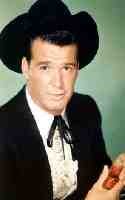The Rockford Rascal blog noted the recent 100 year anniversary of the birth of actor John Wayne by pointing out the strange dichotomy between the public image of John Wayne as the epitome of patriotism and masculinity with his much less heroic personal life. He avoided military service in World War II to stay in Hollywood and make movies while other movie stars like Jimmy Stewart and Clark Gable served in the military and were real-life war heroes.
In the same way that John Wayne is thought of by many as a war hero without actually being one many Americans who want to vote for national security, safety from terrorism and family values have been voting for Republican candidates even though the Bush Administration and the Republicans in Congress have pursued policies and priorities which undermine our strength, make us more likely to be attacked by terrorists and weaken American families.
Progressive bloggers trying to point out that we have been choosing the symbol rather than the reality reminds my brother Dan, who attended a Quaker boarding high school, as did I, of the Quaker desire to replace the symbols and rituals of the mainline Christian churches with the reality of the experience of God, which they believe can be found within each of us. Four hundred years ago in England, George Fox, the founder of the Society of Friends (Quakers), would spread his ideas by going to services at the Anglican church wherever he was and after the priest’s sermon when the congregation was given a chance to ask questions would stand up and ask: "You say Jesus said this and Paul said that. But what canst thou say? Art thou a child of light and hast thou walked in the light?" George Fox called the Anglican priests "professors" because they "professed what they did not possess." They had symbols and rituals and when asked about God they replied by quoting the words of others. Rather than listening to these "professors" George Fox advocated directly experiencing God in an unprogrammed meeting for worship of the Society of Friends.
The belief that there is that of God within everyone led to a strong conviction among Quakers that slavery was evil and must be abolished. Among Quakers women were treated as the equals of men and were allowed and encouraged to attend school and participate fully in the life of the meeting including as leaders at a time when that was a radical idea and position. Quakers also advocated for prison reform and were among the earliest advocates for the idea of reforming rather than just punishing criminals.
Over the last 400 year these Quakers positions on slavery, gender equality and prison reform have gradually been adopted by Western society and have become the majority position, but only after a great struggle in which the mainline Christian churches were mostly fighting on the other side.
My brother Dan just emailed me to comment that perhaps the Quaker idea that rather than following leaders who symbolize some desirable quality we should seek out those who actually possess that quality will be one more Quaker idea that eventually will be adopted by the rest of society.
Monday, May 28, 2007
Subscribe to:
Post Comments (Atom)



2 comments:
The Quakers, like every sect, has had their share of the infamous. And though the church may have been antislavery, there were some that were also involved in the KKK. They are also the group that brought us Richard Millhouse Nixon and he was something of a stinker himself. There are good and bad in every religious sect.
the scoundrel,
Thank you for that addition. I was so focused on presenting these ideas and concepts I forgot to mention that not everyone who calls themselves a Quaker is a perfect embodiment of the Quaker ideals. If you think of anything else I forgot to mention please point it out. We all need all the help we can get.
Post a Comment